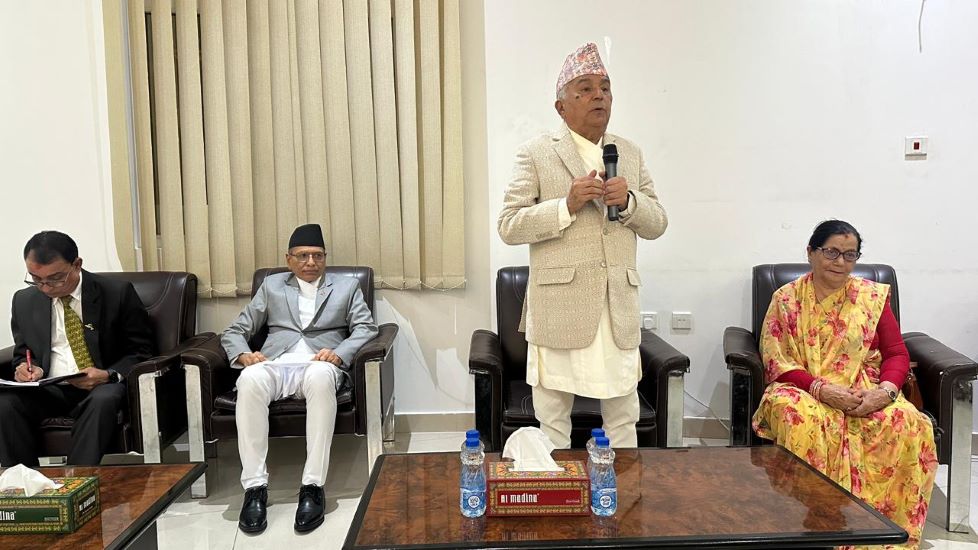Kathmandu, 06 Aug: Radha Baral (name changed), 42, suffered from problems like feeling weak, getting irritated quickly, occasional body heat, and persistent heaviness in her body. This condition lasted for three years.
This began causing conflicts between the couple. Radha even lost interest in physical intimacy. As she was often unwilling to engage in physical relations, her husband started accusing her of being involved with someone else. As a result, she fell into depression.
When she consulted a doctor for advice, she found out that she had reached menopause (i.e., her menstrual cycles had stopped).
Bishnu Magar (name changed) was diagnosed with diabetes (sugar) two years ago. After the diagnosis, the doctor advised him to take medication, but he refused, fearing dependency on the medicine. He has the responsibility of caring for his two- and five-year-old sons and managing all household chores.
Due to diabetes, he had been experiencing increased irritability, physical weakness, and a feeling of heaviness in his body for over a month. Disputes also began to arise between husband and wife, leading them to sleep in separate rooms. The root cause of his condition was only discovered after he sought medical consultation with the help of his sister-in-law.
These are two representative cases that highlight how sexual dysfunction is creating serious challenges in Nepali society.
A national study on sexual dysfunction conducted in 2024 by the local NGO SOLID Nepal (Society for Local Integrated Development Nepal), the Family Welfare Division of the Department of Health Services, and the United Nations Population Fund (UNFPA) revealed that individuals with chronic illnesses such as diabetes and high blood pressure are more likely to suffer from sexual dysfunction. The study also found a higher prevalence of sexual dysfunction in obese individuals compared to others.
According to the findings, 66.8% of individuals without any chronic disease experienced sexual dysfunction, whereas the rates were 71.8% among people with diabetes and 83.2% among those with high blood pressure. Among those with two or more conditions (diabetes, hypertension, or heart disease), the rate of sexual dysfunction rose to 84.6%. The study also showed that body weight plays a role: 76.5% of underweight individuals and 71.4% of those with severe obesity were found to have sexual dysfunction.
Sexual and reproductive health specialist Dr. Khem Bahadur Karki says the main cause of sexual dysfunction is non-communicable diseases. According to him, sexual dysfunction means facing problems in one’s sexual life.
“Sexual dysfunction can damage the relationship between sexual partners or married couples. This can lead to increased instances of sexual misconduct, violence, and even crimes like rape,” he explains.
Psychologist Sanam Paudel states that when one partner experiences sexual pleasure and the other does not, it creates emotional distance in the relationship — a common starting point for domestic violence.
Menopause in women naturally leads to a decline in sexual desire. However, during this phase, some husbands may become suspicious or accuse their wives of infidelity, which increases family conflict.
The study found that sexual dysfunction is slightly more prevalent in men than women. Among individuals over 30, about 72% of men and 67% of women were found to suffer from sexual dysfunction. Among the men affected, 5% reported severe dysfunction, while 32% had mild symptoms. Of those experiencing dysfunction, 84% of men said they were unable to attain satisfaction from intercourse. Similarly, 92% of both men and women responded that they lacked sexual desire.
Dr. Karki notes that factors like mental stress, hectic lifestyles, couples living apart, family disputes, and an imbalance between work and rest negatively impact sexual life. Physical factors such as infections in the reproductive organs also contribute to the problem.
More than 90% of those with sexual dysfunction were found to suffer from psychological issues such as stress, anxiety, depression, or trauma. Dr. Karki explains that there is a cyclical relationship between psychological conditions and sexual dysfunction — each influencing and worsening the other, making the problem even more complex.
Although Nepal’s first-ever study on sexual dysfunction has shed light on the issue, this problem is escalating worldwide. Various studies indicate that 49% of women and 43% of men globally experience some form of sexual dysfunction. The issue is particularly prevalent in Asian countries:
-
Malaysia: 27–69%
-
Singapore: 51–73%
-
Hong Kong: Up to 64%
Substance Abuse Worsens the Problem
Research highlights that tobacco and alcohol consumption significantly aggravate sexual dysfunction:
-
Alcohol users: 69% report dysfunction.
-
Long-term smokers (even after quitting): 80% experience issues.
This data underscores the urgent need for awareness, medical intervention, and lifestyle changes to address this silent epidemic.
Let’s Talk About Sexual and Reproductive Health
Sexual and reproductive health expert Dr. Karki emphasizes the need to incorporate sexual and reproductive health and rights into public policies and programs.
He suggests designing integrated programs that include sexual health, sex counseling, treatment of sexual dysfunction, and sexual violence. Dr. Karki also recommends establishing sexual health counseling centers in health institutions and hospitals.
Psychologist Sanam Paudel stresses the importance of open and respectful communication between sexual partners or spouses about sex. She advises not to overlook the role of sexual health in maintaining a healthy and happy family life.
“It’s important to understand that sexual dysfunction is a common health issue,” she says. “There should be no hesitation in seeking proper treatment for it.”
Dr. Karki argues that sexual and reproductive health should be considered a political agenda. “This issue has caused division in society. Therefore, it must be brought into political discussions and debated at the policy level,” he states.
Psychologist Paudel notes that many people hesitate to talk about sexual dysfunction. As a result, some turn to unauthorized sources and take unverified medications before seeking proper health services from credible institutions.
To keep young people sexually healthy, prevent sexual and gender-based violence, eliminate child marriage, and reduce partner-based abuse, Dr. Karki recommends including comprehensive sex education in school and university curricula without delay.






















